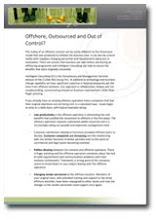IT Transformation programmes represent particularly
large investments for most companies. The business cases for these programmes,
some of which can last up to 3 years, are often compelling with significant
financial returns based upon IT rationalisation, business process optimisation
and reduced headcount. Technology requirements can be planned and costed and
consultants with the required skills can be sourced from inside or outside the
business, but this does not ultimately dictate the likelihood of success or
failure. The effect of the organisational culture represents a significant risk
to large IT programmes and will be ignored at your peril.
Firstly, it needs to be accepted as a risk during the chaos of initiation. During this time management need to obtain an objective view of how employees could potentially react to the change and potential effects on the programme identified (this may require an external view). In my opinion this should be a separate work-stream with dedicated resources, closely linked with training and communications but crucially independent. It is only in this way that a considered plan for cultural change can be assembled and followed. Changes to working culture are slow and the inertia that can exist within large organisations mean that progress initially can be difficult to measure. However, there will be successes and the pace of change should gather momentum as the programme continues.
This is not often the approach taken by organisations who initiate programmes with a flurry of ill-conceived communications about the glory of the long term corporate vision, along with lots of dramatic representations of a new technical dawn which leave many employees feeling intimidated. Much later as the programme itself begins to lose momentum, the head-scratching starts, and urgent soulless communications about the importance of change are issued fortnightly to a workforce who no longer have faith in the long term objective. This is all too late and ultimately the programme will fall short of its original objectives or take much longer to deliver. This does not include the long term effects on morale and culture that will impact significantly on the chances of success for future programmes and create yet more inertia.
Sometimes the only way out of the loop is outsourcing and we have all discussed the problems associated with that decision. Let us hope we can raise the profile of cultural change and improve future programmes of work so that the workforce can feel proud of their achievements and not resentful of an enforced transfer to an anonymous third party.
Firstly, it needs to be accepted as a risk during the chaos of initiation. During this time management need to obtain an objective view of how employees could potentially react to the change and potential effects on the programme identified (this may require an external view). In my opinion this should be a separate work-stream with dedicated resources, closely linked with training and communications but crucially independent. It is only in this way that a considered plan for cultural change can be assembled and followed. Changes to working culture are slow and the inertia that can exist within large organisations mean that progress initially can be difficult to measure. However, there will be successes and the pace of change should gather momentum as the programme continues.
This is not often the approach taken by organisations who initiate programmes with a flurry of ill-conceived communications about the glory of the long term corporate vision, along with lots of dramatic representations of a new technical dawn which leave many employees feeling intimidated. Much later as the programme itself begins to lose momentum, the head-scratching starts, and urgent soulless communications about the importance of change are issued fortnightly to a workforce who no longer have faith in the long term objective. This is all too late and ultimately the programme will fall short of its original objectives or take much longer to deliver. This does not include the long term effects on morale and culture that will impact significantly on the chances of success for future programmes and create yet more inertia.
Sometimes the only way out of the loop is outsourcing and we have all discussed the problems associated with that decision. Let us hope we can raise the profile of cultural change and improve future programmes of work so that the workforce can feel proud of their achievements and not resentful of an enforced transfer to an anonymous third party.






